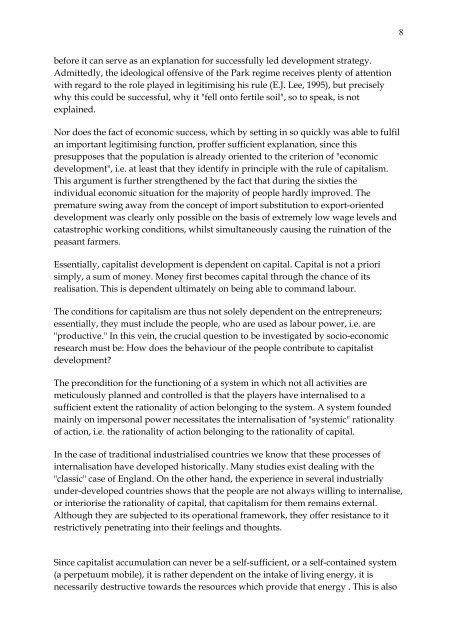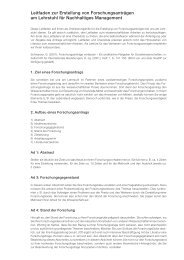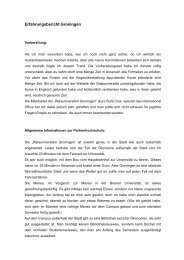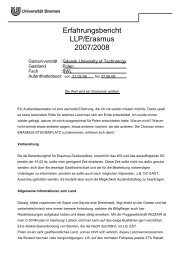Holger Heide Schumpeterian Dynamics in Crisis - Universität Bremen
Holger Heide Schumpeterian Dynamics in Crisis - Universität Bremen
Holger Heide Schumpeterian Dynamics in Crisis - Universität Bremen
Create successful ePaper yourself
Turn your PDF publications into a flip-book with our unique Google optimized e-Paper software.
8<br />
before it can serve as an explanation for successfully led development strategy.<br />
Admittedly, the ideological offensive of the Park regime receives plenty of attention<br />
with regard to the role played <strong>in</strong> legitimis<strong>in</strong>g his rule (E.J. Lee, 1995), but precisely<br />
why this could be successful, why it "fell onto fertile soil", so to speak, is not<br />
expla<strong>in</strong>ed.<br />
Nor does the fact of economic success, which by sett<strong>in</strong>g <strong>in</strong> so quickly was able to fulfil<br />
an important legitimis<strong>in</strong>g function, proffer sufficient explanation, s<strong>in</strong>ce this<br />
presupposes that the population is already oriented to the criterion of "economic<br />
development", i.e. at least that they identify <strong>in</strong> pr<strong>in</strong>ciple with the rule of capitalism.<br />
This argument is further strengthened by the fact that dur<strong>in</strong>g the sixties the<br />
<strong>in</strong>dividual economic situation for the majority of people hardly improved. The<br />
premature sw<strong>in</strong>g away from the concept of import substitution to export-oriented<br />
development was clearly only possible on the basis of extremely low wage levels and<br />
catastrophic work<strong>in</strong>g conditions, whilst simultaneously caus<strong>in</strong>g the ru<strong>in</strong>ation of the<br />
peasant farmers.<br />
Essentially, capitalist development is dependent on capital. Capital is not a priori<br />
simply, a sum of money. Money first becomes capital through the chance of its<br />
realisation. This is dependent ultimately on be<strong>in</strong>g able to command labour.<br />
The conditions for capitalism are thus not solely dependent on the entrepreneurs;<br />
essentially, they must <strong>in</strong>clude the people, who are used as labour power, i.e. are<br />
"productive." In this ve<strong>in</strong>, the crucial question to be <strong>in</strong>vestigated by socio-economic<br />
research must be: How does the behaviour of the people contribute to capitalist<br />
development?<br />
The precondition for the function<strong>in</strong>g of a system <strong>in</strong> which not all activities are<br />
meticulously planned and controlled is that the players have <strong>in</strong>ternalised to a<br />
sufficient extent the rationality of action belong<strong>in</strong>g to the system. A system founded<br />
ma<strong>in</strong>ly on impersonal power necessitates the <strong>in</strong>ternalisation of "systemic" rationality<br />
of action, i.e. the rationality of action belong<strong>in</strong>g to the rationality of capital.<br />
In the case of traditional <strong>in</strong>dustrialised countries we know that these processes of<br />
<strong>in</strong>ternalisation have developed historically. Many studies exist deal<strong>in</strong>g with the<br />
"classic" case of England. On the other hand, the experience <strong>in</strong> several <strong>in</strong>dustrially<br />
under-developed countries shows that the people are not always will<strong>in</strong>g to <strong>in</strong>ternalise,<br />
or <strong>in</strong>teriorise the rationality of capital, that capitalism for them rema<strong>in</strong>s external.<br />
Although they are subjected to its operational framework, they offer resistance to it<br />
restrictively penetrat<strong>in</strong>g <strong>in</strong>to their feel<strong>in</strong>gs and thoughts.<br />
S<strong>in</strong>ce capitalist accumulation can never be a self-sufficient, or a self-conta<strong>in</strong>ed system<br />
(a perpetuum mobile), it is rather dependent on the <strong>in</strong>take of liv<strong>in</strong>g energy, it is<br />
necessarily destructive towards the resources which provide that energy . This is also
















